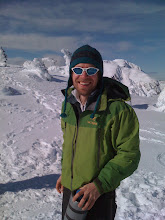Um, no thanks.
Today I got another statement from some environmental groups and Congressional folks that starts like this.
Washington, DC - In response to Interior Secretary Dirk Kempthorne’s decision to gut the polar bear’s threatened status, Reps. Jay Inslee, D-Wash., and Maurice Hinchey, D-N.Y. introduced legislation yesterday that will address impacts to the species from global warming and oil and gas activity. Sen. John Kerry, D-Mass., introduced a similar bill in the Senate earlier this year.The bill seems to be about oil and gas activity, although Inslee's comment refers to global warming, too.
The Polar Bear Seas Protection Act (H.R. 6057) directs DOI to designate critical habitat areas for the polar bear and requires vast improvements in oil spill technology before massive oil and gas activity would be allowed in Alaska’s Beaufort and Chukchi Seas, also known as the Polar Bear Seas. The bill ensures that the polar bear is protected from oil and gas activity – which Interior Secretary Dirk Kempthorne explicitly said yesterday would not be affected by the polar bear’s ESA listing.
“While the listing was a long overdue recognition of scientific reality, the administration included a poison pill by ruling out the one thing that would make it meaningful: an effective policy on stopping global warming. It’ll be business as usual for oil and gas development, which will put polar bears at greater risk from potential spills, onshore infrastructure and disturbances, not to mention, will continue emissions of greenhouse gases that are causing the melting of sea ice in the first place,” said Inslee, prime sponsor of the Polar Bear Seas Protection Act. “This bill will help fill the vacuum of administration leadership by providing important protections for polar bears and their habitat.”
The CBC ran a story on why "Canada's North" is upset about the decision, which started by saying polar bear hunting would be banned and then that it would only been seen as uncooth now.
. . . By listing the polar bears as a threatened species under the U.S. Endangered Species Act, all U.S. federal agencies will have to ensure nothing they do would jeopardize the bears' survival or their sea ice habitat.The AP in Washington wrote this.It would also ban American sport hunters from bringing home polar bear hides as trophies from hunts in the Canadian North. Americans spend about $30,000 to $35,000 to hunt a bear.
Irngaut and others, like Grise Fiord resident Larry Audlaluk, said a ban would spell bad news for some Nunavut communities that rely on the sport hunt for income.
"There are many polar bears, so I think the Americans have no right really to decide on an animal like that," said Audlaluk, a former hunting guide in the small Ellesmere Island community.
While the U.S. government says it does not oppose a subsistence hunt, Audlaluk said he's worried that listing polar bears as a threatened species across the Arctic will create a negative public perception of polar bear hunting in general. . . .
And AP's Steve Quinn in Alaska covered the oil industry response.. . . The restrictions, including one that would provide the bear no more protection from oil drilling in Arctic waters than it now has under another federal law, the Marine Mammal Protection Act, prompted environmentalists and some members of Congress to questions whether the bear will get any more protection at all.
"They're trying to make this a threatened listing in name only with no change in today's impacts and that's not going to fly," said Jamie Rappaport Clark of Defenders of Wildlife and a former director of the U.S. Fish and Wildlife Service in the Clinton administration. . . .
OK, enough about bears.JUNEAU, Alaska (AP) — The lawyers aren't clearing their calendars just yet, but the oil industry is bracing for some courtroom battles to maintain its stake in Alaska's oil-rich fields now that the Interior Department has listed polar bears as a threatened species.
About 15 percent of the nation's oil is being produced in Alaska, and soaring prices for the commodity are pushing companies to look farther and farther offshore to the floors of the Beaufort and Chukchi seas, which are frozen much of the year. . . .

No comments:
Post a Comment